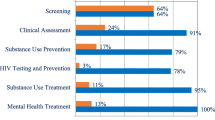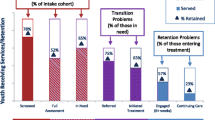Abstract
Despite the high prevalence of substance use disorders among juvenile offenders, most do not receive services. System-level process improvement plans to address unmet service needs can be optimized by combining data-driven decisions and facilitated meetings with behavioral health stakeholders. This paper operationalizes and analyzes the level of specified complexity among process improvement plans evident within 36 juvenile probation and drug courts across 7 states. To inform more effective implementation strategies, this analysis identifies and prioritizes promising courses of agency enhancement toward addressing unmet substance use needs.

Copyright from Knight et al. (2016)

Similar content being viewed by others
References
Aarons, G. A., Fettes, D. L., Hurlburt, M. S., Palinkas, L. A., Gunderson, L., Willging, C. E., & Chaffin, M. J. (2014). Collaboration, negotiation, and coalescence for interagency-collaborative teams to scale-up evident-based practice. Journal of Clinical Child and Adolescent Psychology,43(6), 915–928. https://doi.org/10.1080/15374416.2013.876642.
Aarons, G. A., Green, A. E., Palinkas, L. A., Self-Brown, S., Whitaker, D. J., Lutzker, J. R., … Chaffin, M. J. (2012). Dynamic adaptation process to implement an evidence-based child maltreatment intervention. Implementation Science,7(32). https://doi.org/10.1186/1748-5908-7-32.
Aarons, G. A., Hurlburt, M., & Horwitz, S. M. (2011). Advancing a conceptual model of evidence-based practice implementation in public service sectors. Administration and Policy in Mental Health and Mental Health Services Research,38(1), 4–23. https://doi.org/10.1007/s10488-010-0327-7.
American Society of Addiction Medicine. (2013). The ASAM criteria: Treatment criteria for addictive, substance-related, and co-occurring conditions. Chevy Chase, MD: Author.
Atkins, M. S., Frazier, S. L., Leathers, S. J., Graczyk, P. A., Talbott, E., Jakobsons, L., … Bell, C. C. (2008). Teacher key opinion leaders and mental health consultation in low-income urban schools. Journal of Consulting and Clinical Psychology,76(5), 905–908. https://doi.org/10.1037/a0013036.
Barwick, M. A., Peters, J., & Boydell, K. (2009). Getting to uptake: Do communities of practice support the implementation of evidence-based practice? Journal of the Canadian Academy of Child and Adolescent Psychiatry,18(1), 16–29. https://www.ncbi.nlm.nih.gov/pmc/articles/PMC2651208/.
Becan, J. E., Bartkowski, J., Knight, D. K., Wiley, T., DiClemente, R., Ducharme, L., … Aarons, G. A. (2018). A Model for Rigorously Applying the Exploration, Preparation, Implementation, and Sustainment (EPIS) Framework in the Design and Measurement of a Large Scale Collaborative Multi-site Study. Health and Justice. https://doi.org/10.1186/s40352-018-0068-3.
Belenko, S., & Dembo, R. (2003). Treating adolescent substance abuse problems in the juvenile drug court. International Journal of Law and Psychiatry,26(1), 87–110. https://doi.org/10.1016/s0160-2527(02)00205-4.
Belenko, S., Knight, D., Wasserman, G. A., Dennis, M. L., Wiley, T., Taxman, F. S., … Sales, J. (2017). The Juvenile Justice Behavioral Health Services Cascade: A new framework for measuring unmet substance use treatment services needs among adolescent offenders. Journal of Substance Abuse Treatment,74, 80–91. https://doi.org/10.1016/j.jsat.2016.12.012.
Belenko, S., Sprott, J. B., & Peterson, C. (2004). Drug and alcohol involvement among minority and female juvenile offenders: Treatment and policy issues. Criminal Justice Policy Review,15(1), 3–36. https://doi.org/10.1177/0887403403255068.
Bowser, D., Henry, B., Wasserman, G., Knight, D., Gardner, S., Krupka, K., … Robertson, A. (2018). Comparison of the overlap between juvenile justice case processing and screening & referral to Behavioral Health Services. Journal of Applied Juvenile Justice Services,5(1), 96–125. https://www.ncbi.nlm.nih.gov/pmc/articles/PMC6342497/.
Brooks, J. M., Titler, M. G., Ardery, G., & Herr, K. (2008). The effect of evidence-based acute pain management practices on inpatient costs. Health Services Research,44(1), 245–263. https://doi.org/10.1111/j.1475-6773.2008.00912.x.
Chamberlain, P., Hendricks Brown, C. H., & Saldana, L. (2011). Observational measure of implementation progress in community based settings: The Stages of Implementation Completion (SIC). Implementation Science,6, 116. https://doi.org/10.1186/1748-5908-6-116.
Chamberlain, P., Roberts, R., Jones, H., Marsenich, L., Sosna, T., & Price, J. M. (2012). Three Collaborative models for scaling up evidence-based practices. Administration and Policy in Mental Health and Mental Health Services Research,39(4), 278–290. https://doi.org/10.1007/s10488-011-0349-9.
Chambers, D. A., Glasgow, R. E., & Stange, K. C. (2013). The dynamic sustainability framework: Addressing the paradox of sustainment amid ongoing change. Implementation Science,8, 117. https://doi.org/10.1186/1748-5908-8-117.
Chandler, R. K., Fletcher, B. W., & Volkow, N. D. (2009). Treating drug abuse and addiction in the criminal justice system: Improving public health and safety. Journal of the American Medical Association,301(2), 183–190. https://doi.org/10.1001/jama.2008.976.
Chorpita, B. F., Bernstein, A., Daleiden, E. L., & Research Network on Youth Mental Health. (2008). Driving with roadmaps and dashboards: Using information resources to structure the decision models in service organizations. Administration and Policy in Mental Health and Mental Health Services Research,35(1–2), 114–123. https://doi.org/10.1007/s10488-007-0151-x.
Committee on Substance Abuse. (2011). Substance use screening, brief intervention, and referral to treatment for pediatricians. American Academy of Pediatrics,128(5), e1330–e1340. https://doi.org/10.1542/peds.2011-1754.
Damschroder, L. J., Aron, D. C., Keith, R. E., Kirsh, S. R., Alexander, J. A., & Lowery, J. C. (2009). Fostering implementation of health services research findings into practice: A consolidated framework for advancing implementation science. Implementation Science,4, 50. https://doi.org/10.1186/1748-5908-4-50.
Dansereau, D. F., & Simpson, D. D. (2009). A picture is worth a thousand words: The case for graphic representations. Professional Psychology: Research and Practice,40(1), 104–110. https://doi.org/10.1037/a0011827.
Dennis, M., Smith, C., Knight, D., Belenko, S., Dembo, R., DiClemente, R., … Wiley, T. (2018). Demonstrating the need for and feasibility of applying a behavioral health services cascade framework in juvenile justice. Presentation at the College on Problems of Drug Dependence 80th Annual Scientific Meeting, San Diego, CA.
Gardner, S. K., Elkington, K. S., Knight, D. K., Huang, S., DiClemente, R. D., Spaulding, A. C., & Baird-Thomas, C. (2018). Juvenile justice staff attitudes about HIV/STI prevention, testing, and treatment linkage. Unpublished manuscript, Mississippi State: Social Science Research Center. https://doi.org/10.1186/s40352-019-0096-7.
Gardner, E. M., McLees, M. P., Steiner, J. F., del Rio, C., & Burman, W. J. (2011). The spectrum of engagement in HIV care and its relevance to test-and-treat strategies for prevention of HIV infection. Clinical Infectious Diseases,52(6), 793–800. https://doi.org/10.1093/cid/ciq243.
Glisson, C., Schoenwald, S. K., Hemmelgarn, A., Green, P., Dukes, D., Armstrong, K. S., & Chapman, J. E. (2010). Randomized trial of MST and ARC in a two-level evidence based treatment implementation strategy. Journal of Consulting and Clinical Psychology,78(4), 537–550. https://doi.org/10.1037/a0019160.
Greenhalgh, T., Robert, G., MacFarlane, F., Bate, P., & Kryriakidou, O. (2004). Diffusion of innovations in service organizations: Systematic review and recommendations. The Milbank Quarterly,82(4), 581–629. https://doi.org/10.1111/j.0887-378x.2004.00325.x.
Grol, R. P. T. M., Bosch, M. C., Hulscher, M. E. J. L., Eccles, M. P., & Wensing, M. (2007). Planning and studying improvement in patient care: The use of theoretical perspectives. The Milbank Quarterly,85(1), 93–138. https://doi.org/10.1111/j.1468-0009.2007.00478.x.
Gustafson, D. H., Quanbeck, A. R., Robinson, J. M., Ford II, J. H., Pulvermacher, A., French, M. T., … McCarty, D. (2013). Which elements of improvement collaboratives are most effective? A cluster-randomized trial. Addiction,108(6), 1145–1157. https://doi.org/10.1111/add.12117.
Henderson, C. E., & Taxman, F. S. (2009). Competing values among criminal justice administrators: The importance of substance abuse treatment. Drug and Alcohol Dependence,103(Suppl 1), S7–S16. https://doi.org/10.1016/j.drugalcdep.2008.10.001.
Horan Fisher, J., Becan, J. E., Harris, P. W., Nager, A., Baird-Thomas, C., Hogue, A., … The JJ-TRIALS Cooperative. (2018). Using goal achievement training in juvenile justice settings to improve substance use services for youth on community supervision. Health and Justice,6(1), 10. https://doi.org/10.1186/s40352-018-0067-4.
Hurlburt, M., Aarons, G. A., Fettes, D., Willging, C., Gunderson, L., & Chaffin, M. J. (2014). Interagency Collaborative Team model for capacity building to scale-up evidence-based practice. Children and Youth Services Review,39, 160–168. https://doi.org/10.1016/j.childyouth.2013.10.005.
Keith, R. E., Crosson, J. C., O’Malley, A. S., Cromp, D., & Taylor, E. F. (2017). Using the Consolidated Framework for Implementation Research (CFIR) to produce actionable findings: A rapid-cycle evaluation approach to improving implementation. Implementation Science,12(1), 15. https://doi.org/10.1186/s13012-017-0550-7.
Kieffer, M. P., Mattingly, M., Giphart, A., van de Ven, R., Chouraya, C., Walakira, M., … the EGPAF Technical Directors Forum. (2014). Lessons learned from early implementation of Option B+: The Elizabeth Glaser Pediatric AIDS Foundation Experience in 11 African countries. Journal of Acquired Immune Deficiency Syndromes,67(Suppl 4), S188–S194. https://doi.org/10.1097/qai.0000000000000372.
King-Sears, M. E. (2001). Institutionalizing peer-mediated instruction and interventions in schools: Beyond “Train and Hope”. Remedial and Special Education,22(2), 89–101. https://doi.org/10.1177/074193250102200203.
Knight, D. K., Belenko, S., Wiley, T., Robertson, A. A., Arrigona, N., Dennis, M., … The JJ-TRIALS Cooperative. (2016). Juvenile Justice—Translational Research on Interventions for Adolescents in the Legal System (JJ-TRIALS): A cluster randomized trial targeting system-wide improvement in substance use services. Implementation Science,11, 57. https://doi.org/10.1186/s13012-016-0423-5.
Knight, D. K., Joe, G. W., Morse, D. T., Smith, C., Knudsen, H., Johnson, I., … Wiley, T. R. A. (2019). Organizational context and individual adaptability in promoting perceived importance and use of best practices for substance use. Journal of Behavioral Health Services & Research,46(2), 192–216. https://doi.org/10.1007/s11414-018-9618-7.
Kochevar, L. K., & Yano, E. M. (2006). Understanding health care organization needs and context: Beyond performance gaps. Journal of General Internal Medicine,21(Suppl 2), S25–S29. https://doi.org/10.1111/j.1525-1497.2006.00359.x.
Kötter, T., Blozik, E., & Scherer, M. (2012). Methods for the guideline-based development of quality indicators—A systematic review. Implementation Science,7, 21. https://doi.org/10.1186/1748-5908-7-21.
Lawlor, K. B., & Hornyak, M. J. (2012). Smart goals: How the application of smart goals can contribute to achievement of student learning outcomes. Developments in Business Simulation and Experiential Learning,39, 259–267. https://absel-ojs-ttu.tdl.org/absel/index.php/absel/article/view/90/86.
Leukefeld, C. G., Cawood, M., Wiley, T., Robertson, A., Horan Fisher, J., Arrigona, N., … The JJ-TRIALS Cooperative. (2017). The benefits of community and juvenile justice involvement in organizational research. Journal of Juvenile Justice,6(1), 112–124. https://www.ncbi.nlm.nih.gov/pmc/articles/PMC5562037/.
Locke, E. A., & Latham, G. P. (1990). A theory of goal setting & task performance. Englewood Cliffs, NJ: Prentice-Hall, Inc. https://doi.org/10.5860/choice.28-0608.
Morrison, M. (2010). History of SMART objectives. Retrieved from https://rapidbi.com/history-of-smart-objectives.
Mugavero, M. J., Amico, K. R., Horn, T., & Thompson, M. A. (2013). The state of engagement in HIV care in the United States: From cascade to continuum to control. Clinical Infectious Diseases,57(8), 1164–1171. https://doi.org/10.1093/cid/cit420.
National Institute on Alcohol Abuse and Alcoholism. (2015). Alcohol screening and brief intervention for youth: A practitioner’s guide (NIH Publication No. 11-7805, revised). Retrieved from https://www.niaaa.nih.gov/alcohol-screening-and-brief-intervention-youth-practitioners-guide.
New York State Department of Health. (1999, April). Disease screening—Statistics teaching tools. Retrieved from https://www.health.ny.gov/diseases/chronic/discreen.htm.
Orwin, R. G., Edwards, J. M., Buchanan, R. M., Flewelling, R. L., & Landy, A. L. (2012). Data-driven decision making in the prevention of substance-related harm: Results from the Strategic Prevention Framework State Incentive Grant Program. Contemporary Drug Problems,39(1), 73–106. https://doi.org/10.1177/009145091203900105.
Pearson, F. S., Shafer, M. S., Dembo, R., del Mar Vega-Debién, G., Pankow, J., Duvall, J. L., … Patterson, Y. (2014). Efficacy of a process improvement intervention on delivery of HIV services to offenders: A multisite trial. American Journal of Public Health, 104(12), 2385–2391. https://doi.org/10.2105/ajph.2014.302035.
Prendergast, M., Welsh, W. N., Stein, L., Lehman, W., Melnick, G., Warda, U., … Duvall, J. (2017). Influence of organizational characteristics on success in implementing process improvement goals in correctional treatment settings. Journal of Behavioral Health Services & Research,44(4), 625–646. https://doi.org/10.1007/s11414-016-9531-x.
Proctor, E. K., Powell, B. J., & McMillen, J. C. (2013). Implementation strategies: Recommendations for specifying and reporting. Implementation Science,8, 139. https://doi.org/10.1186/1748-5908-8-139.
Schneider, S., & Simpson, L. (2011). Getting on board with juvenile justice information technologies. In F. T. Sherman & F. H. Jacobs (Eds.), Juvenile justice: Advancing research, policy, and practice. Hoboken, NJ: Wiley. https://doi.org/10.1002/9781118093375.ch22.
Taxman, F. S., Henderson, C. E., & Belenko, S. (2009). Organizational context, systems change, and adopting treatment delivery systems in the criminal justice system. Drug and Alcohol Dependence,103(Suppl 1), S1–S6. https://doi.org/10.1016/j.drugalcdep.2009.03.003.
Taylor, M. J., McNicholas, C., Nicolay, C., Darzi, A., Bell, D., & Reed, J. E. (2014). Systematic review of the application of the plan-do-study-act method to improve quality in healthcare. BMJ Quality & Safety,23(4), 290–298. https://doi.org/10.1136/bmjqs-2013-001862.
Young, D. W., Dembo, R., & Henderson, C. E. (2007). A national survey of substance abuse treatment for juvenile offenders. Journal of Substance Abuse Treatment,32(3), 255–266. https://doi.org/10.1016/j.jsat.2006.12.018.
Young, D., Moline, K., Farrell, J., & Bierie, J. (2006). Best implementation practices: Disseminating new assessment technologies in a juvenile justice agency. Crime & Delinquency,52(1), 135–158. https://doi.org/10.1177/0011128705281752.
Acknowledgements
The authors would like to thank the following members of the Study Design Workgroup for their assistance and participation in curriculum and methodological development activities: Barbara Estrada, Kate Elkington, Leah Hamilton, Philip Harris, Kevin Knight, James Maccarone, Larkin McReynolds, Alexis Nager, Traci Rieckmann, Eve Rose, Anne Spaulding, Gail Wasserman, and Matt Webster.
Funding
This study was funded under the JJ-TRIALS cooperative agreement, funded at the National Institute on Drug Abuse (NIDA) by the National Institutes of Health (NIH). The authors gratefully acknowledge the collaborative contributions of NIDA and support from the following grant awards: Chestnut Health Systems (U01DA036221); Columbia University (U01DA036226); Emory University (U01DA036233); Mississippi State University (U01DA036176); Temple University (U01DA036225); Texas Christian University (U01DA036224); University of Kentucky (U01DA036158), and University of Miami (R21DA044378). NIDA Science Officer on this project is Tisha Wiley. The contents of this publication are solely the responsibility of the authors and do not necessarily represent the official views of the NIDA, NIH, or the participating universities or JJ systems.
Author information
Authors and Affiliations
Corresponding author
Ethics declarations
Conflict of interest
GAA serves on the Editorial Board for Administration and Policy in Mental Health and Mental Health Services Research; all decisions on this paper were made by another editor. The authors declare that they have no other competing interests.
Ethical Approval
All procedures performed in studies involving human participants were in accordance with the ethical standards of the institutional review boards for each of the seven research institutions and the coordinating center and with the 1964 Helsinki declaration and its later amendments or comparable ethical standards.
Informed Consent
Informed consent was obtained from all individual participants included in the study.
Additional information
Publisher's Note
Springer Nature remains neutral with regard to jurisdictional claims in published maps and institutional affiliations.
Rights and permissions
About this article
Cite this article
Becan, J.E., Fisher, J.H., Johnson, I.D. et al. Improving Substance Use Services for Juvenile Justice-Involved Youth: Complexity of Process Improvement Plans in a Large Scale Multi-site Study. Adm Policy Ment Health 47, 501–514 (2020). https://doi.org/10.1007/s10488-019-01007-z
Published:
Issue Date:
DOI: https://doi.org/10.1007/s10488-019-01007-z




